Palliative Care Case Study: Ethical, Communication, and Care Planning
VerifiedAdded on 2020/09/21
|8
|2386
|343
Case Study
AI Summary
This case study presents the scenario of Tom, an Aboriginal patient admitted to the hospital after fainting, highlighting the complexities of his palliative care. The report delves into the ethical and legal principles at play, emphasizing the importance of respecting Tom's cultural background, family dynamics, and his preferences regarding treatment, including his desire for traditional Aboriginal medicine. The case explores the role of power of attorney, shared decision-making, and the need for effective communication between healthcare providers, Tom, and his family, particularly addressing the conflict surrounding morphine administration. The paper outlines communication strategies such as cultural awareness and active listening, along with a proposed care plan that considers both pharmacological interventions for symptom management (e.g., breathing difficulties and pain relief) and Tom's preferences. The conclusion reiterates the core issues of the case, including the need to balance medical recommendations with Tom's autonomy, cultural beliefs, and end-of-life care wishes.
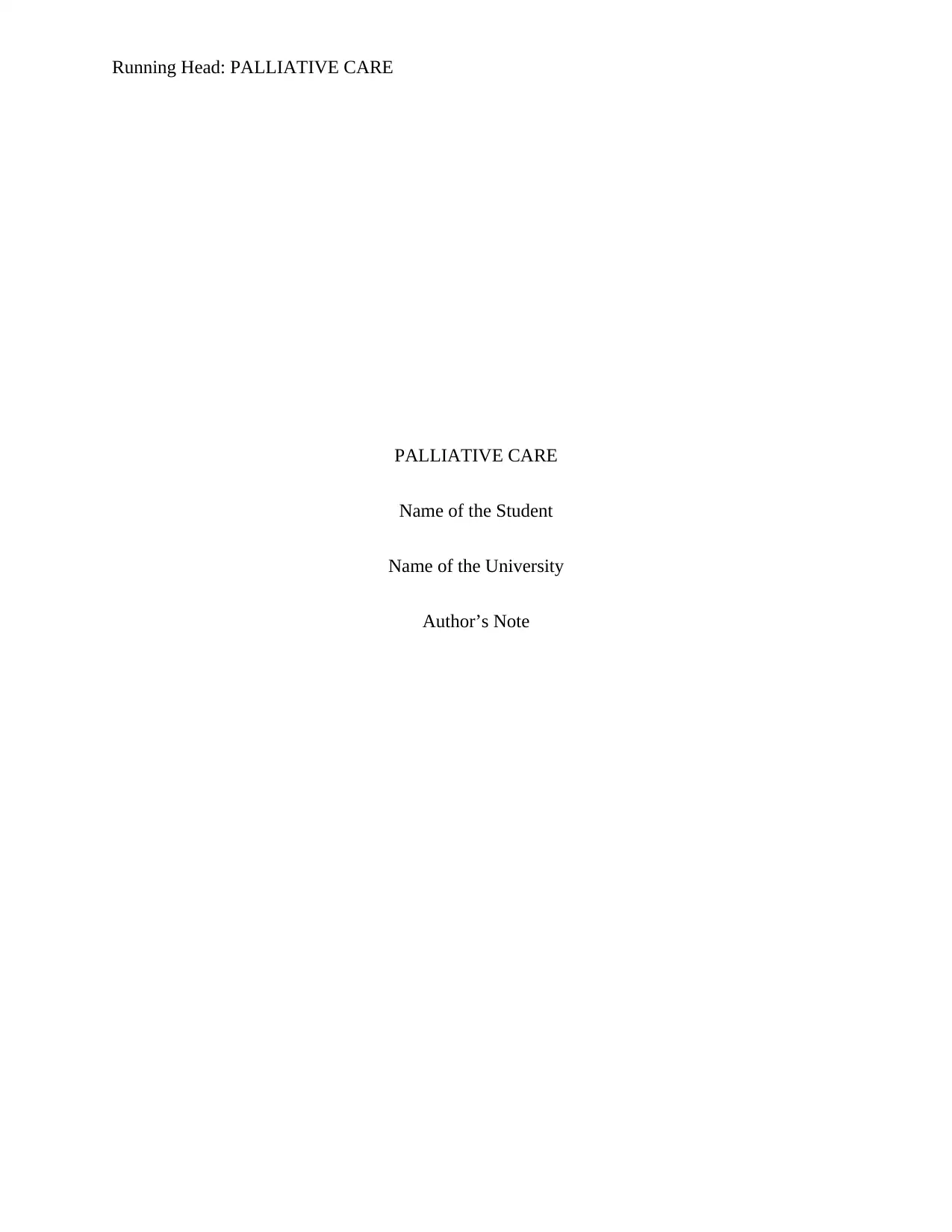
Running Head: PALLIATIVE CARE
PALLIATIVE CARE
Name of the Student
Name of the University
Author’s Note
PALLIATIVE CARE
Name of the Student
Name of the University
Author’s Note
Paraphrase This Document
Need a fresh take? Get an instant paraphrase of this document with our AI Paraphraser
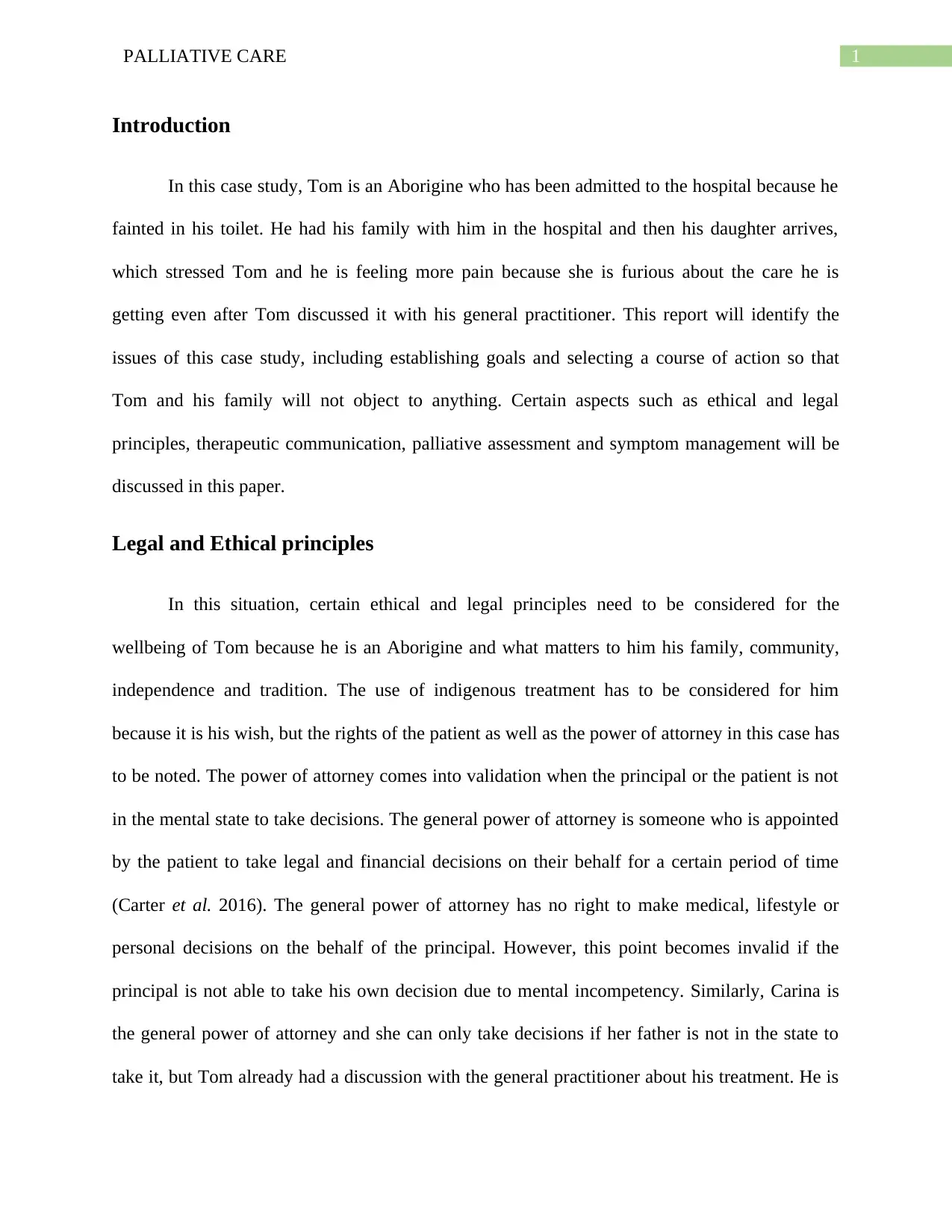
1PALLIATIVE CARE
Introduction
In this case study, Tom is an Aborigine who has been admitted to the hospital because he
fainted in his toilet. He had his family with him in the hospital and then his daughter arrives,
which stressed Tom and he is feeling more pain because she is furious about the care he is
getting even after Tom discussed it with his general practitioner. This report will identify the
issues of this case study, including establishing goals and selecting a course of action so that
Tom and his family will not object to anything. Certain aspects such as ethical and legal
principles, therapeutic communication, palliative assessment and symptom management will be
discussed in this paper.
Legal and Ethical principles
In this situation, certain ethical and legal principles need to be considered for the
wellbeing of Tom because he is an Aborigine and what matters to him his family, community,
independence and tradition. The use of indigenous treatment has to be considered for him
because it is his wish, but the rights of the patient as well as the power of attorney in this case has
to be noted. The power of attorney comes into validation when the principal or the patient is not
in the mental state to take decisions. The general power of attorney is someone who is appointed
by the patient to take legal and financial decisions on their behalf for a certain period of time
(Carter et al. 2016). The general power of attorney has no right to make medical, lifestyle or
personal decisions on the behalf of the principal. However, this point becomes invalid if the
principal is not able to take his own decision due to mental incompetency. Similarly, Carina is
the general power of attorney and she can only take decisions if her father is not in the state to
take it, but Tom already had a discussion with the general practitioner about his treatment. He is
Introduction
In this case study, Tom is an Aborigine who has been admitted to the hospital because he
fainted in his toilet. He had his family with him in the hospital and then his daughter arrives,
which stressed Tom and he is feeling more pain because she is furious about the care he is
getting even after Tom discussed it with his general practitioner. This report will identify the
issues of this case study, including establishing goals and selecting a course of action so that
Tom and his family will not object to anything. Certain aspects such as ethical and legal
principles, therapeutic communication, palliative assessment and symptom management will be
discussed in this paper.
Legal and Ethical principles
In this situation, certain ethical and legal principles need to be considered for the
wellbeing of Tom because he is an Aborigine and what matters to him his family, community,
independence and tradition. The use of indigenous treatment has to be considered for him
because it is his wish, but the rights of the patient as well as the power of attorney in this case has
to be noted. The power of attorney comes into validation when the principal or the patient is not
in the mental state to take decisions. The general power of attorney is someone who is appointed
by the patient to take legal and financial decisions on their behalf for a certain period of time
(Carter et al. 2016). The general power of attorney has no right to make medical, lifestyle or
personal decisions on the behalf of the principal. However, this point becomes invalid if the
principal is not able to take his own decision due to mental incompetency. Similarly, Carina is
the general power of attorney and she can only take decisions if her father is not in the state to
take it, but Tom already had a discussion with the general practitioner about his treatment. He is
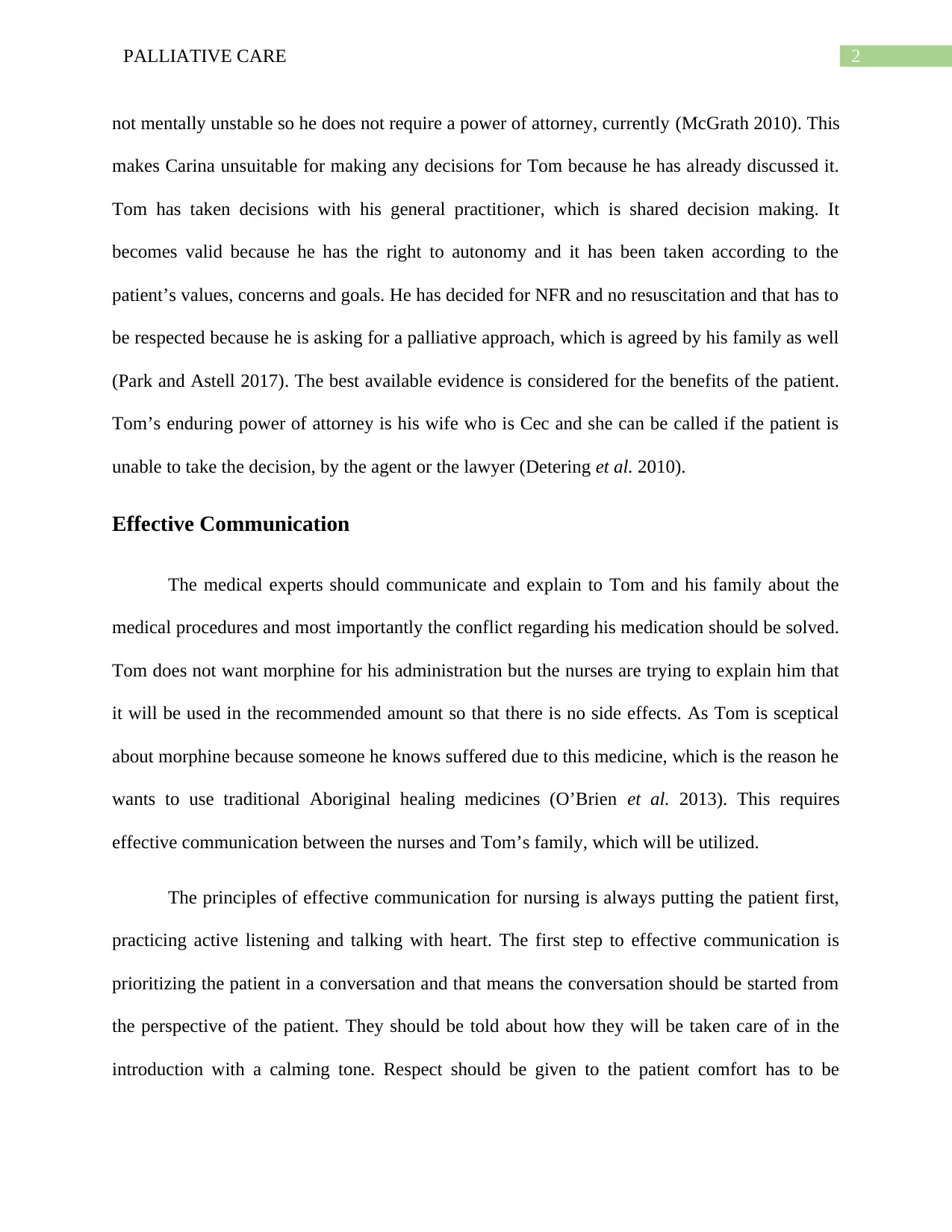
2PALLIATIVE CARE
not mentally unstable so he does not require a power of attorney, currently (McGrath 2010). This
makes Carina unsuitable for making any decisions for Tom because he has already discussed it.
Tom has taken decisions with his general practitioner, which is shared decision making. It
becomes valid because he has the right to autonomy and it has been taken according to the
patient’s values, concerns and goals. He has decided for NFR and no resuscitation and that has to
be respected because he is asking for a palliative approach, which is agreed by his family as well
(Park and Astell 2017). The best available evidence is considered for the benefits of the patient.
Tom’s enduring power of attorney is his wife who is Cec and she can be called if the patient is
unable to take the decision, by the agent or the lawyer (Detering et al. 2010).
Effective Communication
The medical experts should communicate and explain to Tom and his family about the
medical procedures and most importantly the conflict regarding his medication should be solved.
Tom does not want morphine for his administration but the nurses are trying to explain him that
it will be used in the recommended amount so that there is no side effects. As Tom is sceptical
about morphine because someone he knows suffered due to this medicine, which is the reason he
wants to use traditional Aboriginal healing medicines (O’Brien et al. 2013). This requires
effective communication between the nurses and Tom’s family, which will be utilized.
The principles of effective communication for nursing is always putting the patient first,
practicing active listening and talking with heart. The first step to effective communication is
prioritizing the patient in a conversation and that means the conversation should be started from
the perspective of the patient. They should be told about how they will be taken care of in the
introduction with a calming tone. Respect should be given to the patient comfort has to be
not mentally unstable so he does not require a power of attorney, currently (McGrath 2010). This
makes Carina unsuitable for making any decisions for Tom because he has already discussed it.
Tom has taken decisions with his general practitioner, which is shared decision making. It
becomes valid because he has the right to autonomy and it has been taken according to the
patient’s values, concerns and goals. He has decided for NFR and no resuscitation and that has to
be respected because he is asking for a palliative approach, which is agreed by his family as well
(Park and Astell 2017). The best available evidence is considered for the benefits of the patient.
Tom’s enduring power of attorney is his wife who is Cec and she can be called if the patient is
unable to take the decision, by the agent or the lawyer (Detering et al. 2010).
Effective Communication
The medical experts should communicate and explain to Tom and his family about the
medical procedures and most importantly the conflict regarding his medication should be solved.
Tom does not want morphine for his administration but the nurses are trying to explain him that
it will be used in the recommended amount so that there is no side effects. As Tom is sceptical
about morphine because someone he knows suffered due to this medicine, which is the reason he
wants to use traditional Aboriginal healing medicines (O’Brien et al. 2013). This requires
effective communication between the nurses and Tom’s family, which will be utilized.
The principles of effective communication for nursing is always putting the patient first,
practicing active listening and talking with heart. The first step to effective communication is
prioritizing the patient in a conversation and that means the conversation should be started from
the perspective of the patient. They should be told about how they will be taken care of in the
introduction with a calming tone. Respect should be given to the patient comfort has to be
⊘ This is a preview!⊘
Do you want full access?
Subscribe today to unlock all pages.

Trusted by 1+ million students worldwide
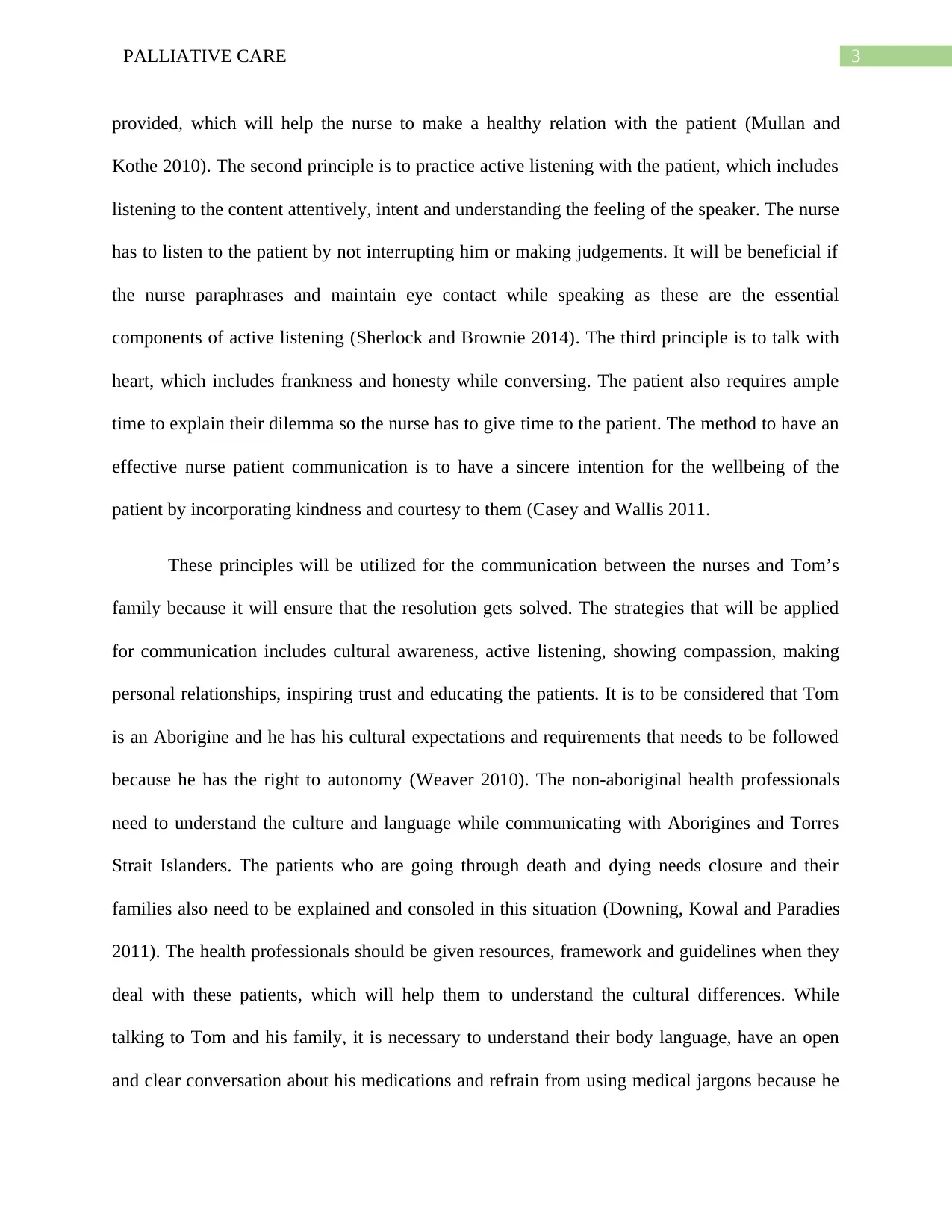
3PALLIATIVE CARE
provided, which will help the nurse to make a healthy relation with the patient (Mullan and
Kothe 2010). The second principle is to practice active listening with the patient, which includes
listening to the content attentively, intent and understanding the feeling of the speaker. The nurse
has to listen to the patient by not interrupting him or making judgements. It will be beneficial if
the nurse paraphrases and maintain eye contact while speaking as these are the essential
components of active listening (Sherlock and Brownie 2014). The third principle is to talk with
heart, which includes frankness and honesty while conversing. The patient also requires ample
time to explain their dilemma so the nurse has to give time to the patient. The method to have an
effective nurse patient communication is to have a sincere intention for the wellbeing of the
patient by incorporating kindness and courtesy to them (Casey and Wallis 2011.
These principles will be utilized for the communication between the nurses and Tom’s
family because it will ensure that the resolution gets solved. The strategies that will be applied
for communication includes cultural awareness, active listening, showing compassion, making
personal relationships, inspiring trust and educating the patients. It is to be considered that Tom
is an Aborigine and he has his cultural expectations and requirements that needs to be followed
because he has the right to autonomy (Weaver 2010). The non-aboriginal health professionals
need to understand the culture and language while communicating with Aborigines and Torres
Strait Islanders. The patients who are going through death and dying needs closure and their
families also need to be explained and consoled in this situation (Downing, Kowal and Paradies
2011). The health professionals should be given resources, framework and guidelines when they
deal with these patients, which will help them to understand the cultural differences. While
talking to Tom and his family, it is necessary to understand their body language, have an open
and clear conversation about his medications and refrain from using medical jargons because he
provided, which will help the nurse to make a healthy relation with the patient (Mullan and
Kothe 2010). The second principle is to practice active listening with the patient, which includes
listening to the content attentively, intent and understanding the feeling of the speaker. The nurse
has to listen to the patient by not interrupting him or making judgements. It will be beneficial if
the nurse paraphrases and maintain eye contact while speaking as these are the essential
components of active listening (Sherlock and Brownie 2014). The third principle is to talk with
heart, which includes frankness and honesty while conversing. The patient also requires ample
time to explain their dilemma so the nurse has to give time to the patient. The method to have an
effective nurse patient communication is to have a sincere intention for the wellbeing of the
patient by incorporating kindness and courtesy to them (Casey and Wallis 2011.
These principles will be utilized for the communication between the nurses and Tom’s
family because it will ensure that the resolution gets solved. The strategies that will be applied
for communication includes cultural awareness, active listening, showing compassion, making
personal relationships, inspiring trust and educating the patients. It is to be considered that Tom
is an Aborigine and he has his cultural expectations and requirements that needs to be followed
because he has the right to autonomy (Weaver 2010). The non-aboriginal health professionals
need to understand the culture and language while communicating with Aborigines and Torres
Strait Islanders. The patients who are going through death and dying needs closure and their
families also need to be explained and consoled in this situation (Downing, Kowal and Paradies
2011). The health professionals should be given resources, framework and guidelines when they
deal with these patients, which will help them to understand the cultural differences. While
talking to Tom and his family, it is necessary to understand their body language, have an open
and clear conversation about his medications and refrain from using medical jargons because he
Paraphrase This Document
Need a fresh take? Get an instant paraphrase of this document with our AI Paraphraser
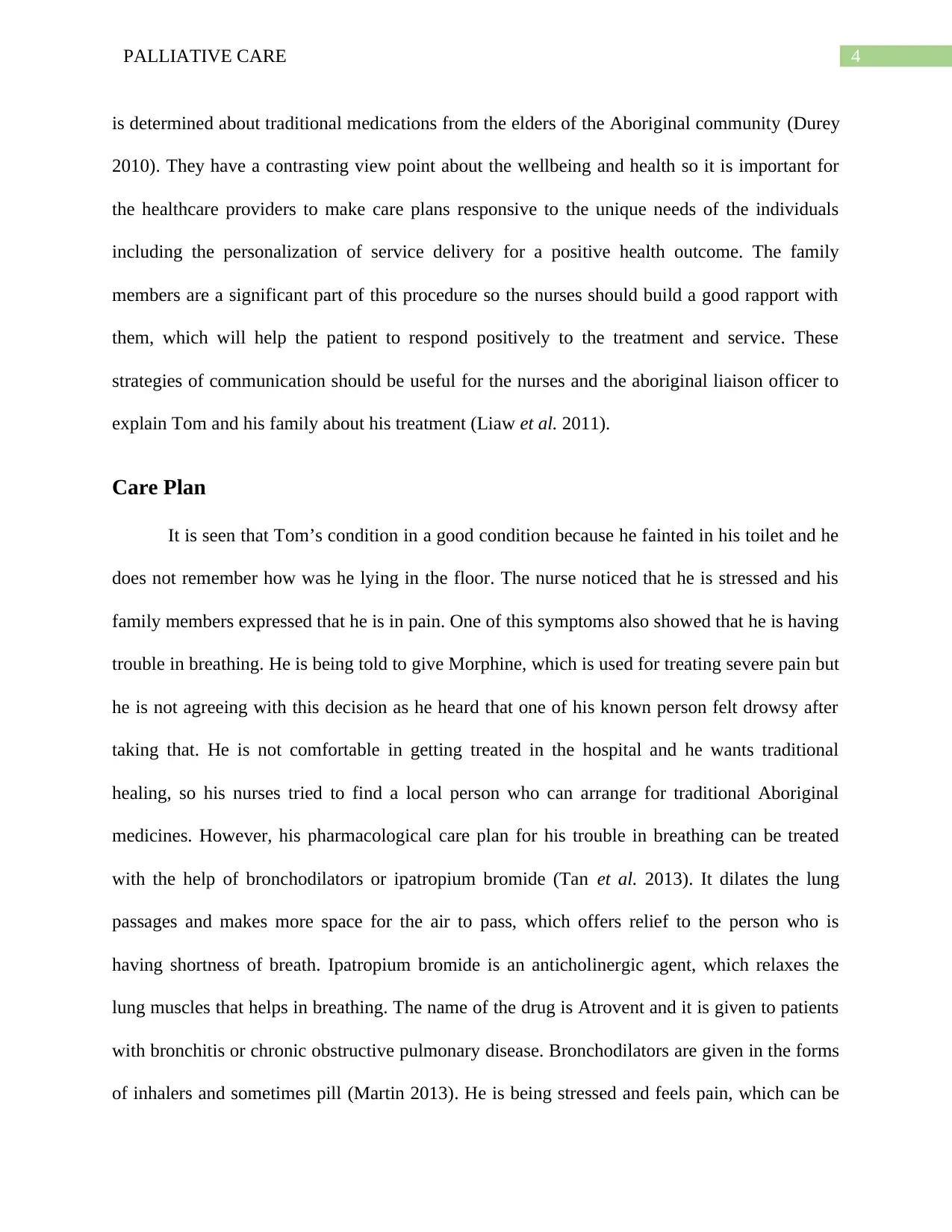
4PALLIATIVE CARE
is determined about traditional medications from the elders of the Aboriginal community (Durey
2010). They have a contrasting view point about the wellbeing and health so it is important for
the healthcare providers to make care plans responsive to the unique needs of the individuals
including the personalization of service delivery for a positive health outcome. The family
members are a significant part of this procedure so the nurses should build a good rapport with
them, which will help the patient to respond positively to the treatment and service. These
strategies of communication should be useful for the nurses and the aboriginal liaison officer to
explain Tom and his family about his treatment (Liaw et al. 2011).
Care Plan
It is seen that Tom’s condition in a good condition because he fainted in his toilet and he
does not remember how was he lying in the floor. The nurse noticed that he is stressed and his
family members expressed that he is in pain. One of this symptoms also showed that he is having
trouble in breathing. He is being told to give Morphine, which is used for treating severe pain but
he is not agreeing with this decision as he heard that one of his known person felt drowsy after
taking that. He is not comfortable in getting treated in the hospital and he wants traditional
healing, so his nurses tried to find a local person who can arrange for traditional Aboriginal
medicines. However, his pharmacological care plan for his trouble in breathing can be treated
with the help of bronchodilators or ipatropium bromide (Tan et al. 2013). It dilates the lung
passages and makes more space for the air to pass, which offers relief to the person who is
having shortness of breath. Ipatropium bromide is an anticholinergic agent, which relaxes the
lung muscles that helps in breathing. The name of the drug is Atrovent and it is given to patients
with bronchitis or chronic obstructive pulmonary disease. Bronchodilators are given in the forms
of inhalers and sometimes pill (Martin 2013). He is being stressed and feels pain, which can be
is determined about traditional medications from the elders of the Aboriginal community (Durey
2010). They have a contrasting view point about the wellbeing and health so it is important for
the healthcare providers to make care plans responsive to the unique needs of the individuals
including the personalization of service delivery for a positive health outcome. The family
members are a significant part of this procedure so the nurses should build a good rapport with
them, which will help the patient to respond positively to the treatment and service. These
strategies of communication should be useful for the nurses and the aboriginal liaison officer to
explain Tom and his family about his treatment (Liaw et al. 2011).
Care Plan
It is seen that Tom’s condition in a good condition because he fainted in his toilet and he
does not remember how was he lying in the floor. The nurse noticed that he is stressed and his
family members expressed that he is in pain. One of this symptoms also showed that he is having
trouble in breathing. He is being told to give Morphine, which is used for treating severe pain but
he is not agreeing with this decision as he heard that one of his known person felt drowsy after
taking that. He is not comfortable in getting treated in the hospital and he wants traditional
healing, so his nurses tried to find a local person who can arrange for traditional Aboriginal
medicines. However, his pharmacological care plan for his trouble in breathing can be treated
with the help of bronchodilators or ipatropium bromide (Tan et al. 2013). It dilates the lung
passages and makes more space for the air to pass, which offers relief to the person who is
having shortness of breath. Ipatropium bromide is an anticholinergic agent, which relaxes the
lung muscles that helps in breathing. The name of the drug is Atrovent and it is given to patients
with bronchitis or chronic obstructive pulmonary disease. Bronchodilators are given in the forms
of inhalers and sometimes pill (Martin 2013). He is being stressed and feels pain, which can be
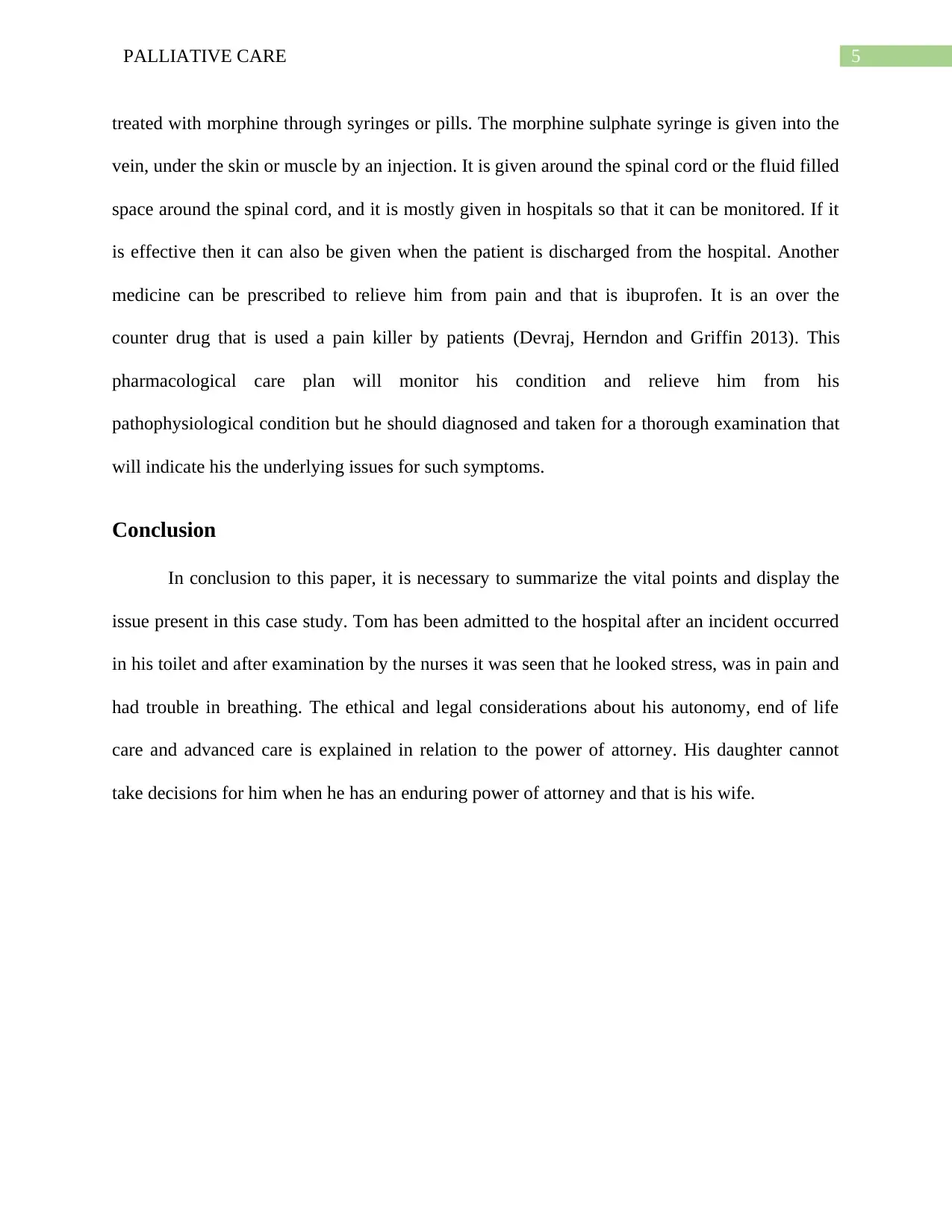
5PALLIATIVE CARE
treated with morphine through syringes or pills. The morphine sulphate syringe is given into the
vein, under the skin or muscle by an injection. It is given around the spinal cord or the fluid filled
space around the spinal cord, and it is mostly given in hospitals so that it can be monitored. If it
is effective then it can also be given when the patient is discharged from the hospital. Another
medicine can be prescribed to relieve him from pain and that is ibuprofen. It is an over the
counter drug that is used a pain killer by patients (Devraj, Herndon and Griffin 2013). This
pharmacological care plan will monitor his condition and relieve him from his
pathophysiological condition but he should diagnosed and taken for a thorough examination that
will indicate his the underlying issues for such symptoms.
Conclusion
In conclusion to this paper, it is necessary to summarize the vital points and display the
issue present in this case study. Tom has been admitted to the hospital after an incident occurred
in his toilet and after examination by the nurses it was seen that he looked stress, was in pain and
had trouble in breathing. The ethical and legal considerations about his autonomy, end of life
care and advanced care is explained in relation to the power of attorney. His daughter cannot
take decisions for him when he has an enduring power of attorney and that is his wife.
treated with morphine through syringes or pills. The morphine sulphate syringe is given into the
vein, under the skin or muscle by an injection. It is given around the spinal cord or the fluid filled
space around the spinal cord, and it is mostly given in hospitals so that it can be monitored. If it
is effective then it can also be given when the patient is discharged from the hospital. Another
medicine can be prescribed to relieve him from pain and that is ibuprofen. It is an over the
counter drug that is used a pain killer by patients (Devraj, Herndon and Griffin 2013). This
pharmacological care plan will monitor his condition and relieve him from his
pathophysiological condition but he should diagnosed and taken for a thorough examination that
will indicate his the underlying issues for such symptoms.
Conclusion
In conclusion to this paper, it is necessary to summarize the vital points and display the
issue present in this case study. Tom has been admitted to the hospital after an incident occurred
in his toilet and after examination by the nurses it was seen that he looked stress, was in pain and
had trouble in breathing. The ethical and legal considerations about his autonomy, end of life
care and advanced care is explained in relation to the power of attorney. His daughter cannot
take decisions for him when he has an enduring power of attorney and that is his wife.
⊘ This is a preview!⊘
Do you want full access?
Subscribe today to unlock all pages.

Trusted by 1+ million students worldwide
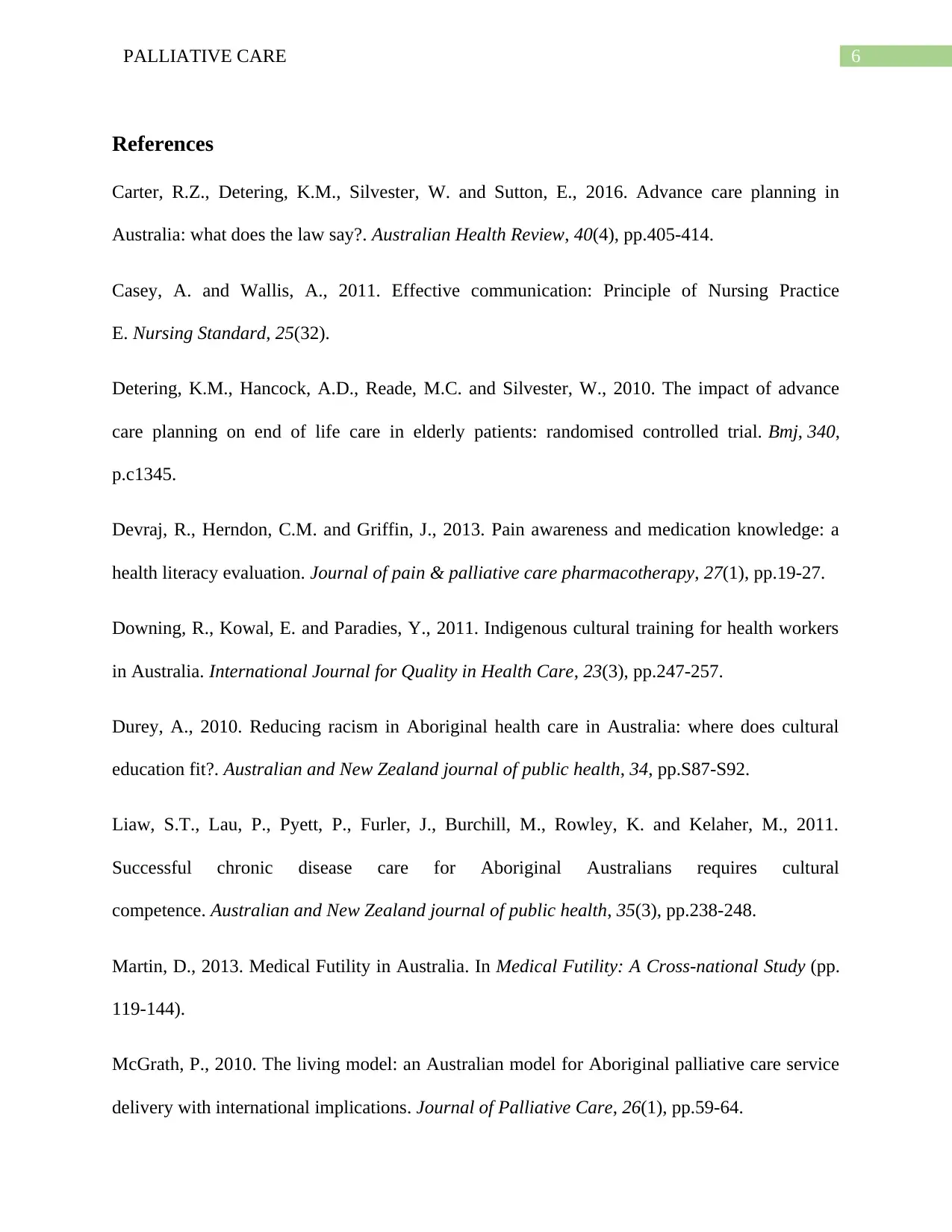
6PALLIATIVE CARE
References
Carter, R.Z., Detering, K.M., Silvester, W. and Sutton, E., 2016. Advance care planning in
Australia: what does the law say?. Australian Health Review, 40(4), pp.405-414.
Casey, A. and Wallis, A., 2011. Effective communication: Principle of Nursing Practice
E. Nursing Standard, 25(32).
Detering, K.M., Hancock, A.D., Reade, M.C. and Silvester, W., 2010. The impact of advance
care planning on end of life care in elderly patients: randomised controlled trial. Bmj, 340,
p.c1345.
Devraj, R., Herndon, C.M. and Griffin, J., 2013. Pain awareness and medication knowledge: a
health literacy evaluation. Journal of pain & palliative care pharmacotherapy, 27(1), pp.19-27.
Downing, R., Kowal, E. and Paradies, Y., 2011. Indigenous cultural training for health workers
in Australia. International Journal for Quality in Health Care, 23(3), pp.247-257.
Durey, A., 2010. Reducing racism in Aboriginal health care in Australia: where does cultural
education fit?. Australian and New Zealand journal of public health, 34, pp.S87-S92.
Liaw, S.T., Lau, P., Pyett, P., Furler, J., Burchill, M., Rowley, K. and Kelaher, M., 2011.
Successful chronic disease care for Aboriginal Australians requires cultural
competence. Australian and New Zealand journal of public health, 35(3), pp.238-248.
Martin, D., 2013. Medical Futility in Australia. In Medical Futility: A Cross-national Study (pp.
119-144).
McGrath, P., 2010. The living model: an Australian model for Aboriginal palliative care service
delivery with international implications. Journal of Palliative Care, 26(1), pp.59-64.
References
Carter, R.Z., Detering, K.M., Silvester, W. and Sutton, E., 2016. Advance care planning in
Australia: what does the law say?. Australian Health Review, 40(4), pp.405-414.
Casey, A. and Wallis, A., 2011. Effective communication: Principle of Nursing Practice
E. Nursing Standard, 25(32).
Detering, K.M., Hancock, A.D., Reade, M.C. and Silvester, W., 2010. The impact of advance
care planning on end of life care in elderly patients: randomised controlled trial. Bmj, 340,
p.c1345.
Devraj, R., Herndon, C.M. and Griffin, J., 2013. Pain awareness and medication knowledge: a
health literacy evaluation. Journal of pain & palliative care pharmacotherapy, 27(1), pp.19-27.
Downing, R., Kowal, E. and Paradies, Y., 2011. Indigenous cultural training for health workers
in Australia. International Journal for Quality in Health Care, 23(3), pp.247-257.
Durey, A., 2010. Reducing racism in Aboriginal health care in Australia: where does cultural
education fit?. Australian and New Zealand journal of public health, 34, pp.S87-S92.
Liaw, S.T., Lau, P., Pyett, P., Furler, J., Burchill, M., Rowley, K. and Kelaher, M., 2011.
Successful chronic disease care for Aboriginal Australians requires cultural
competence. Australian and New Zealand journal of public health, 35(3), pp.238-248.
Martin, D., 2013. Medical Futility in Australia. In Medical Futility: A Cross-national Study (pp.
119-144).
McGrath, P., 2010. The living model: an Australian model for Aboriginal palliative care service
delivery with international implications. Journal of Palliative Care, 26(1), pp.59-64.
Paraphrase This Document
Need a fresh take? Get an instant paraphrase of this document with our AI Paraphraser
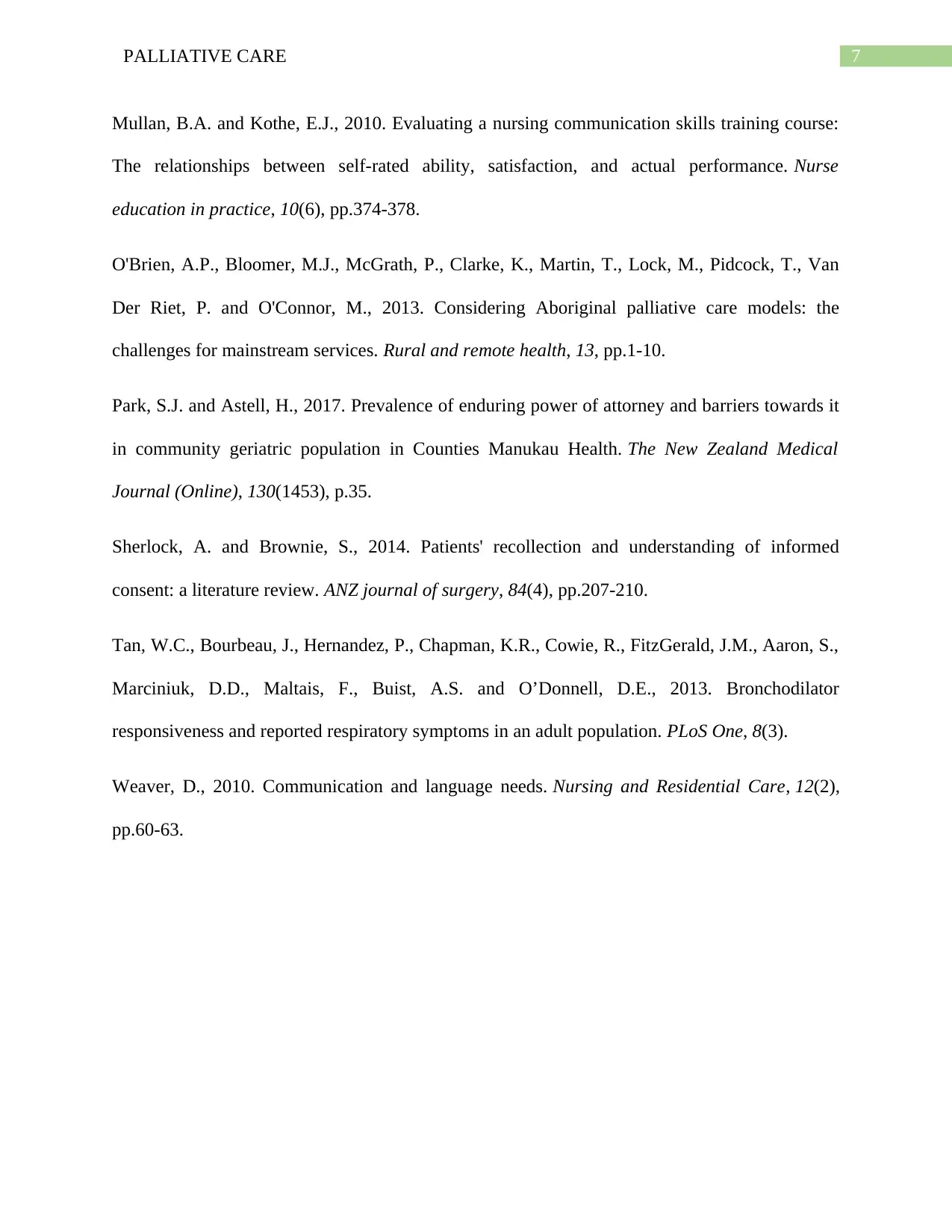
7PALLIATIVE CARE
Mullan, B.A. and Kothe, E.J., 2010. Evaluating a nursing communication skills training course:
The relationships between self-rated ability, satisfaction, and actual performance. Nurse
education in practice, 10(6), pp.374-378.
O'Brien, A.P., Bloomer, M.J., McGrath, P., Clarke, K., Martin, T., Lock, M., Pidcock, T., Van
Der Riet, P. and O'Connor, M., 2013. Considering Aboriginal palliative care models: the
challenges for mainstream services. Rural and remote health, 13, pp.1-10.
Park, S.J. and Astell, H., 2017. Prevalence of enduring power of attorney and barriers towards it
in community geriatric population in Counties Manukau Health. The New Zealand Medical
Journal (Online), 130(1453), p.35.
Sherlock, A. and Brownie, S., 2014. Patients' recollection and understanding of informed
consent: a literature review. ANZ journal of surgery, 84(4), pp.207-210.
Tan, W.C., Bourbeau, J., Hernandez, P., Chapman, K.R., Cowie, R., FitzGerald, J.M., Aaron, S.,
Marciniuk, D.D., Maltais, F., Buist, A.S. and O’Donnell, D.E., 2013. Bronchodilator
responsiveness and reported respiratory symptoms in an adult population. PLoS One, 8(3).
Weaver, D., 2010. Communication and language needs. Nursing and Residential Care, 12(2),
pp.60-63.
Mullan, B.A. and Kothe, E.J., 2010. Evaluating a nursing communication skills training course:
The relationships between self-rated ability, satisfaction, and actual performance. Nurse
education in practice, 10(6), pp.374-378.
O'Brien, A.P., Bloomer, M.J., McGrath, P., Clarke, K., Martin, T., Lock, M., Pidcock, T., Van
Der Riet, P. and O'Connor, M., 2013. Considering Aboriginal palliative care models: the
challenges for mainstream services. Rural and remote health, 13, pp.1-10.
Park, S.J. and Astell, H., 2017. Prevalence of enduring power of attorney and barriers towards it
in community geriatric population in Counties Manukau Health. The New Zealand Medical
Journal (Online), 130(1453), p.35.
Sherlock, A. and Brownie, S., 2014. Patients' recollection and understanding of informed
consent: a literature review. ANZ journal of surgery, 84(4), pp.207-210.
Tan, W.C., Bourbeau, J., Hernandez, P., Chapman, K.R., Cowie, R., FitzGerald, J.M., Aaron, S.,
Marciniuk, D.D., Maltais, F., Buist, A.S. and O’Donnell, D.E., 2013. Bronchodilator
responsiveness and reported respiratory symptoms in an adult population. PLoS One, 8(3).
Weaver, D., 2010. Communication and language needs. Nursing and Residential Care, 12(2),
pp.60-63.
1 out of 8
Related Documents
Your All-in-One AI-Powered Toolkit for Academic Success.
+13062052269
info@desklib.com
Available 24*7 on WhatsApp / Email
![[object Object]](/_next/static/media/star-bottom.7253800d.svg)
Unlock your academic potential
Copyright © 2020–2026 A2Z Services. All Rights Reserved. Developed and managed by ZUCOL.





